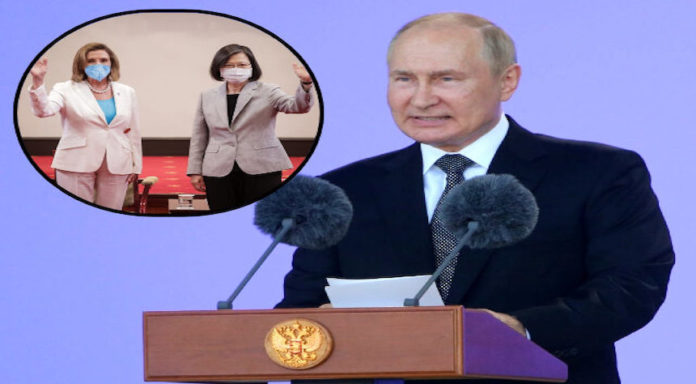
Russian leader Vladimir Putin described Tuesday’s visit by Nancy Pelosi, the U.S. House Speaker (D-CA), to Taiwan on August 2, as “a brazen display of disrespect for other nations and their own international obligations.” He was referring to China’s illegal territorial claims on Taiwan’s sovereign island nation, according to Russia’s official government site.
Putin made the following statement in a video address on August 16 to the participants and their guests at the tenth Moscow Conference on International Security.
The recent US attempts to inflame tensions in the Asia-Pacific region and fuel them have been repeated. The US’s escapade to Taiwan is more than a mere voyage of an unresponsible politician. It is part of a purpose-oriented, deliberate US strategy to destabilize the region and create chaos around the globe. This is a brazen display of disrespect for other nations and their international obligations. This is a provocative act that we have carefully planned.
China and Russia share the sixth-largest international boundary in the world. Moscow and Beijing have maintained formal diplomatic relations with one another and have become closer in recent months after Russia’s latest war against Ukraine, which was launched on February 24, though China has not endorsed the Ukrainian invasion. Putin stated that Ukraine had “no tradition” of sovereignty and that it was part of Russia before launching an invasion. In public statements, Beijing stressed Ukraine’s sovereignty on the matter.
Hua Chunying, a spokeswoman for the Chinese Foreign Ministry stated that “Taiwan certainly is not Ukraine.” “Taiwan was always an inalienable piece of China’s territory. This historical and legal fact is indisputable.
In response to the war, the U.S. government placed a number of financial sanctions against Russian entities and companies. It also encouraged its political allies in this regard to do so. On February 24, the ongoing financial sanctions campaign began. It has encouraged Moscow not to pursue traditional political and business opportunities in the West, but instead to explore alternative options in the East, particularly in China and India.
At the G20 Foreign Ministers Meeting, Bali, Indonesia on July 7, Wang Yi, China’s Foreign Minister, met Sergey Lavrov, Russian Foreign Minister.
According to the U.S.-China Economic and Security Review Commission website, “Wang reiterated” China’s claim that it held an ‘objective and neutral’ position regarding Russia’s invasion of Ukraine. While also confirming deeper bilateral cooperation with Russia,
Pelosi was the highest ranking U.S. official to visit Taiwan for 25 years, landing in Taipei, its capital, on August 2. Pelosi’s visit lasted from August 2 through August 3 and included a meeting with President Tsai-wen and a joint press conference on August 3.
Pelosi spoke at the joint press conference about the “One China Policy”
The Taiwan Relations Act was created 40 years ago. It aims to build a strong relationship between our countries. This includes advancing our mutual interests in governance, economy, security, and respecting the One China policy. As you defend Taiwan’s freedom and sovereignty, our solidarity with you has never been more vital.
Pelosi spoke of Washington’s “One China Policy,” which is the U.S. government’s interpretation of the “One China Principle”. Beijing regards Taiwan as a part of China and prevents any other foreign government from establishing formal diplomatic relations with China. With its “One China Policy,” the U.S. government maintains diplomatic ties with China’s central government. This policy states that “China” is only one nation, but doesn’t necessarily include Taiwan.
The United States has a longstanding one China strategy, guided by the Taiwan Relations Act and the U.S.-China Joint Communiques as well as the Six Assurances. In a May 28 fact sheet, the U.S. State Department stated that it opposes unilateral changes to Taiwan’s status quo; they do not support Taiwan’s independence and expect cross-Strait disputes to be solved peacefully.
Beijing has been increasingly threatening to “reunify Taiwan” with the Chinese “mainland,” which i.e. China since the island nation is off China’s southeast coast. Pelosi’s symbolic trip to Taiwan in August was reacted by the Chinese Communist Party, who launched days-long, live-fire military drills in the airspace and water immediately around Taiwan, which is separated by China by the Taiwan Strait. Forbes noted in June that the Taiwan Strait measures only 86 nautical miles wide at its narrowest point. Forbes compared it to Key West (Florida) and Cuba.

